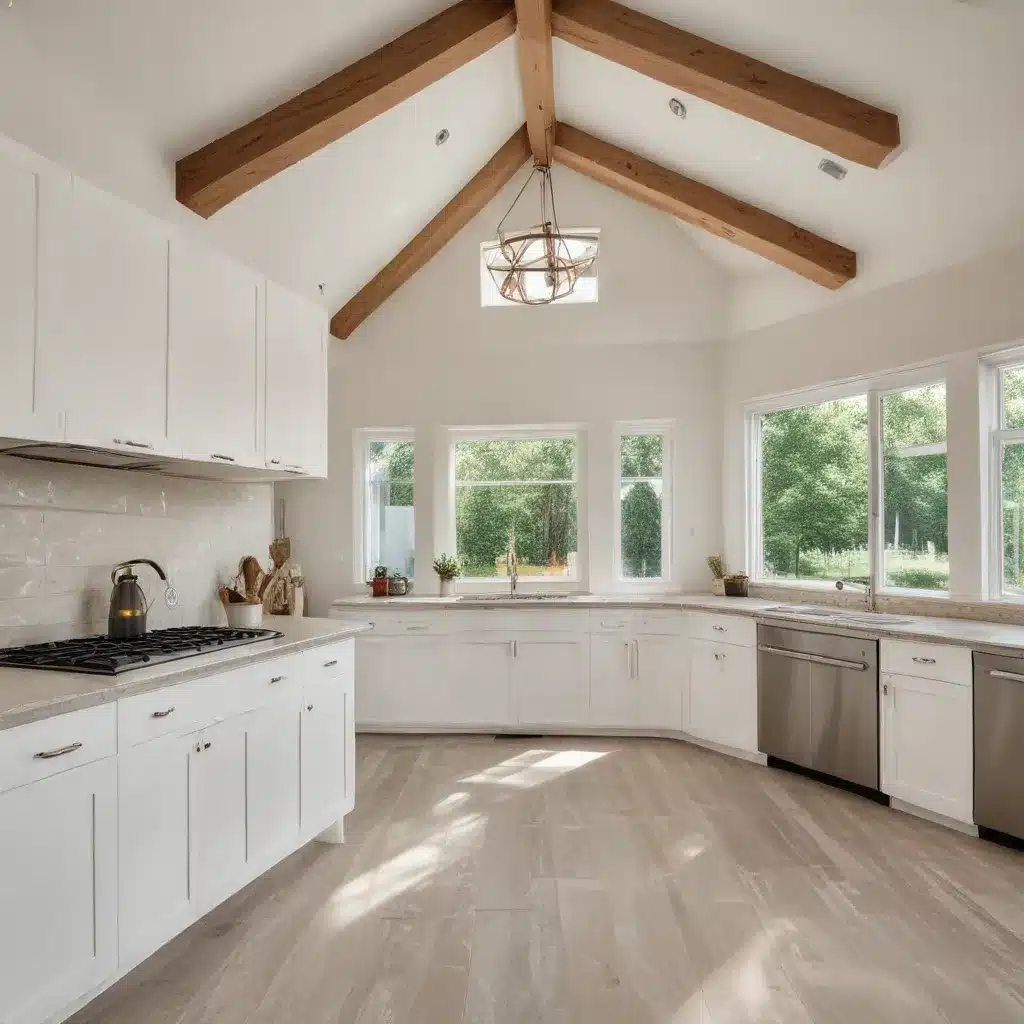
Sustainable Home Renovations: Enhancing Resale Value
As an experienced home improvement consultant, I’ve seen firsthand how sustainable renovations can significantly boost a home’s resale value. Homeowners who invest in eco-friendly upgrades and energy-efficient design features are not only reducing their environmental impact but also positioning their property to sell faster and for a higher price.
Environmental Impact of Home Renovations
When it comes to sustainable home renovations, the focus often starts with material selection. Eco-friendly materials, such as bamboo flooring, low-VOC paints, and recycled-content countertops, are becoming increasingly popular among homeowners and contractors alike. These products not only minimize waste and pollution during the renovation process but also continue to promote energy efficiency and indoor air quality long after the project is complete.
In addition to material choices, improving a home’s energy efficiency can have a substantial impact on its environmental footprint and resale value. Upgrades like high-performance windows, enhanced insulation, and smart home technology can significantly reduce a home’s energy consumption, leading to lower utility bills and a smaller carbon footprint. These improvements are often viewed as valuable assets by eco-conscious buyers, who are willing to pay a premium for homes that prioritize sustainability.
Home Renovation Trends
As homeowners and buyers become more environmentally aware, the demand for sustainable design features has been on the rise. Popular sustainable design features include solar panels, green roofs, water-efficient landscaping, and geothermal heating and cooling systems. These features not only reduce a home’s environmental impact but also provide long-term cost savings for the homeowner.
Emerging green building techniques, such as passive solar design, biophilic design, and net-zero energy construction, are also gaining traction in the home renovation market. These innovative approaches to home design and construction prioritize energy efficiency, renewable energy sources, and indoor environmental quality, making them highly desirable for buyers seeking a sustainable living experience.
Increase Resale Value with Sustainable Upgrades
Numerous studies have demonstrated the positive impact of sustainable home renovations on resale value. According to Freddie Mac research, homes with high energy-efficiency ratings sold for an average of 2.7% more than comparable homes without such designations. Furthermore, the higher the energy efficiency rating, the greater the resale value premium, with some homes selling for up to 5% more.
When it comes to high-demand renovations, energy-efficient features and eco-friendly upgrades consistently rank among the top priorities for homebuyers. The National Association of Home Builders’ “What Home Buyers Really Want” survey found that energy-efficient features were among the most sought-after “must-have” items for today’s homebuyers, highlighting the growing importance of sustainability in the housing market.
By strategically investing in sustainable home renovations, homeowners can maximize their return on investment (ROI) and appeal to a broader pool of potential buyers. Upgrades like solar panel installation, high-efficiency HVAC systems, and water-saving plumbing fixtures not only enhance the property’s green credentials but also demonstrate a long-term commitment to reducing energy and water consumption, which can be highly attractive to eco-conscious buyers.
Homeowner Considerations
When planning sustainable home renovations, budgeting is a crucial factor to consider. While the upfront costs of eco-friendly upgrades may be higher than traditional options, the long-term cost savings and potential resale value increase can often justify the investment. Homeowners should carefully weigh the short-term and long-term financial implications of their sustainable renovation choices.
Another important aspect to consider is the long-term maintenance of sustainable home features. Proper care and upkeep of high-efficiency appliances, renewable energy systems, and water-conserving landscaping are essential to ensuring the continued performance and value of these upgrades. Homeowners should familiarize themselves with the maintenance requirements and budget accordingly.
Regulatory and Legal Aspects
As sustainability becomes a key focus in the housing market, many local governments and municipalities have implemented various sustainability initiatives to encourage eco-friendly home renovations. These may include tax credits, rebate programs, or zoning regulations that prioritize energy-efficient and environmentally-friendly construction. Homeowners should research the specific incentives and requirements in their area to maximize the benefits of their sustainable renovations.
It’s important to note that some sustainable home renovations may require specialized permits or compliance with local building codes. Homeowners should consult with their local authorities and ensure that their renovation plans meet all necessary legal and regulatory requirements before commencing any work.
Selecting Sustainable Home Renovation Contractors
When embarking on a sustainable home renovation project, it’s crucial to vet the expertise of potential contractors. Look for professionals who have experience in eco-friendly design, certifications in green building practices, and a proven track record of delivering high-quality, environmentally-responsible renovations. Asking for references and portfolios can help homeowners identify contractors who are well-versed in sustainable construction techniques and materials.
In addition to expertise, ensuring quality workmanship is also essential for the long-term performance and value of sustainable home upgrades. Homeowners should thoroughly review the contractor’s warranties, project timelines, and communication protocols to ensure that the renovation process and final results meet their expectations and adhere to sustainable best practices.
Sustainable home renovations offer a unique opportunity for homeowners to not only enhance the environmental impact of their property but also capitalize on the growing demand for eco-friendly housing. By strategically investing in energy-efficient upgrades, renewable energy systems, and green design features, homeowners can position their homes to sell faster and for a higher price, all while contributing to a more sustainable future. With careful planning, research, and the guidance of experienced sustainable renovation professionals, homeowners can unlock the full potential of their property and enjoy the benefits of a greener, more valuable home.



